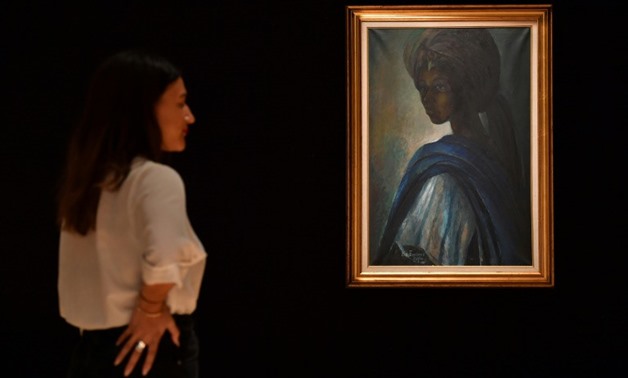"I think of it as the African Mona Lisa," said award-winning novelist Ben Okri, gazing at the long-lost portrait of a Nigerian princess which recently turned up in a London flat.
Ben Enwonwu's 1974 painting of Adetutu "Tutu" Ademiluyi, daughter of a Yoruba king, has taken on almost mythical status in the painter's native Nigeria.
It was last seen in 1975 but is now up for sale after its surprise rediscovery.
"It has been a legendary painting for 40 years, everybody keeps talking about Tutu, saying 'where is Tutu?'," the Booker Prize-winning writer Okri told AFP.
As a prominent Nigerian cultural figure on the world stage, Okri viewed the painting at prestigious London auction house Bonhams, where the work will be sold on February 28.
"He wasn't just painting the girl, he was painting the whole tradition. It's a symbol of hope and regeneration to Nigeria, it's a symbol of the phoenix rising," he said.
"I spent hours looking at it, making up for the time that we hadn't seen it. It's been a work of rumour, but here it is, crystallised."
 Writer Ben Okri called Ben Enwonwu's "Tutu" painting "a symbol of hope and regeneration" for Nigeria
Writer Ben Okri called Ben Enwonwu's "Tutu" painting "a symbol of hope and regeneration" for Nigeria
- Missing masterpiece -
The work was uncovered by Giles Peppiatt, director of Modern African Art at Bonhams, after a north London family contacted him following lucrative recent sales of Nigerian artworks.
"It was quite remarkable when I walked into this flat in north London and saw it hanging on the wall, it was about the last thing I expected to see," he explained.
"As soon as I saw it I knew it was authentic, but I couldn't say that at the time to the owners because you can't just blurt that out."
After confirming the search for "Tutu" was over, the family "were, not surprisingly, pretty astounded," he revealed. "It's a missing masterpiece."
 Writer Ben Okri called Ben Enwonwu's "Tutu" painting "a symbol of hope and regeneration" for Nigeria
Writer Ben Okri called Ben Enwonwu's "Tutu" painting "a symbol of hope and regeneration" for Nigeria
- 'Prize work' -
Enwonwu, who died in 1994, is considered the father of Nigerian modernism. He made three paintings of "Tutu", the locations of all of which had been a mystery until the recent discovery.
The works became symbols of peace following the clash of ethnic groups in the Nigerian–Biafran conflict of the late 1960s.
"The sitter is Yoruba and Ben Enwonwu was Ibo, so they were of different ethnic tribes," said Eliza Sawyer, specialist in Bonhams' African Art department.
"It was an important symbol of reconciliation."
Enwonwu was from a politically-connected Ibo family and his father was a traditional sculptor. The painter stumbled upon his most famous muse by accident.
"He would go around local villages and sketch local scenes and figures, and he encountered this young woman whom he thought was just entrancing and requested to paint her, not knowing her stature," explained Sawyer.
"She was a little taken back by the request," she added.
"It is the peak of the artist's career, there's also the sitter's status as a princess and thirdly the painting had been lost. That all creates an awful lot of mystery."
The rediscovered painting was last displayed at the Italian embassy in Lagos in 1975, and was bought by the father of the north London family during a business trip.
"It was pretty much regarded as his prize work," explained Peppiatt.
"I think he was secretly in love with the sitter. She is a very pretty lady.
"It's pretty audacious, with the light under the chin, which focuses you on the head. As a bit of painting it stands on its own anyway, without any of the other stories," he added.
The painting is expected to sell for around £250,000 ($347,000, 282,000 euros) when it goes on sale jointly in London and Lagos on February 28, but Okri argued that its worth was more than financial.
"It gives us a glimpse of an important African reconfiguration of the art of portraiture," he said.
"It's going to start a fire, start a debate. Never have they given proper due to African painters. This is the perfect work to start" to ask why, he added.



Comments
Leave a Comment